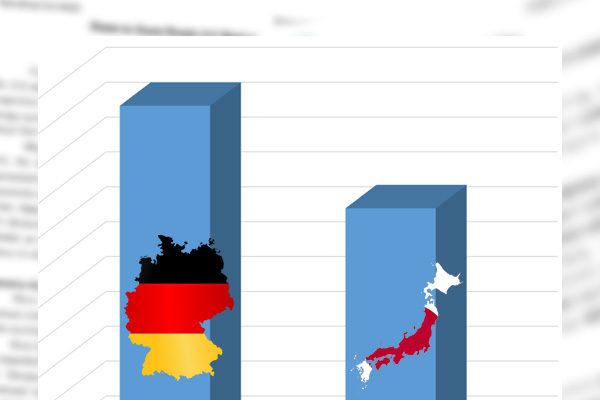In 2023, it became certain that Japan’s nominal GDP (gross domestic product) on a dollar basis was overtaken by Germany, dropping Japan to the fourth largest economy in the world. Since countries are not competing with each other, however, ranking countries in terms of GDP is meaningless. The real issue is whether we can have hope for the future of Japanese society in the face of the reality that its economy has hardly grown and wages have not increased in the “lost three decades” after the bursting of the bubble economy, while Germany’s economy has grown steadily.
Nominal ranking reversal
When comparing nominal GDP in U.S. dollars in Japan and Germany, we should take note of two points: (1) Germany’s nominal GDP is inflated by a much higher inflation rate than in Japan due to factors such as energy price spikes caused by the Ukraine war, and (2) Japan’s nominal GDP in U.S. dollars is deflated by the yen’s much faster depreciation against the dollar than the euro’s. In fact, German economy has recently failed to fare well, contracting by 0.3% on an inflation-adjusted real basis in 2023, marking a negative growth for the first in three years.
Japan and Germany have been said to have similar economic structures, featuring strong manufacturing. The fact is that Japan has retained current account surpluses since 1981, and Germany has also done so since 2001. The current account balance consists of the trade balance, or the difference between exports and imports, and the income balance, or the difference between external receipt and payment of dividends and interest, the fruits of overseas investment. While the trade balance is a component of GDP, the income balance, which does not generate domestic value added, is not a component of GDP.
Germany, while increasing its inward and outward investment, has retained its domestic manufacturing bases to expand exports, leading the trade surplus to account for most of its current account surplus. This is attributable to two factors. First, the euro’s exchange rate is based on the average trade balance of all euro participants, working to the advantage of Germany that is more competitive than other euro participants. Second, currency exchange risks and tariff burdens for Germany have declined thanks to the expansion of euro participants and European Union member countries.
Meanwhile, In Japan, not only the increase in imports due to the surge in energy prices has been significant but also the import of fossil fuels has increased due to the shutdown of nuclear power plants. Furthermore, the hollowing out of manufacturing bases has progressed due to the long-standing high yen value until the start of Abenomics, making it difficult for exports to grow. As a result, Japan’s trade balance has turned red since 2011. Its current account surplus is attributable to an income balance surplus that does not contribute to GDP.
Meaningless GDP ranking by country
The purpose of economic policy is to realize an affluent life for the people and to provide a financial foundation for activities, including responses in times of natural disasters and other emergencies. The people’s bright outlook for the future and positive activities are required to achieve an affluent national life and to realize resilient economic growth that can respond to emergencies. In the process of recovery from the COVID-19 pandemic, a flexible economic foundation in which wages and prices rise moderately is being fostered in a shift away from the past inflexible economy. Don’t react nervously to changes in a meaningless GDP ranking by country.
Etsuro Honda is a member of the Planning Committee of the Japan Institute for National Fundamentals and a former special adviser to the cabinet. He advised then Prime Minister Shinzo Abe for the success of Abenomics.


